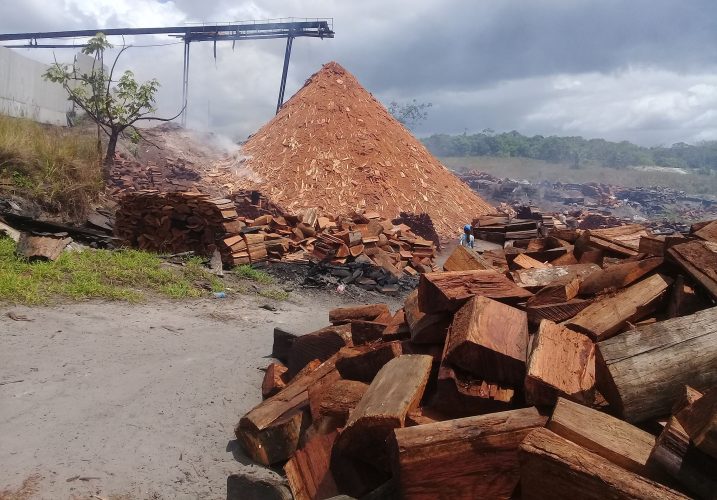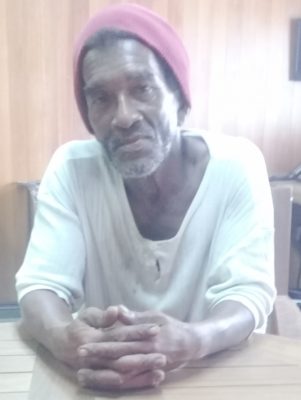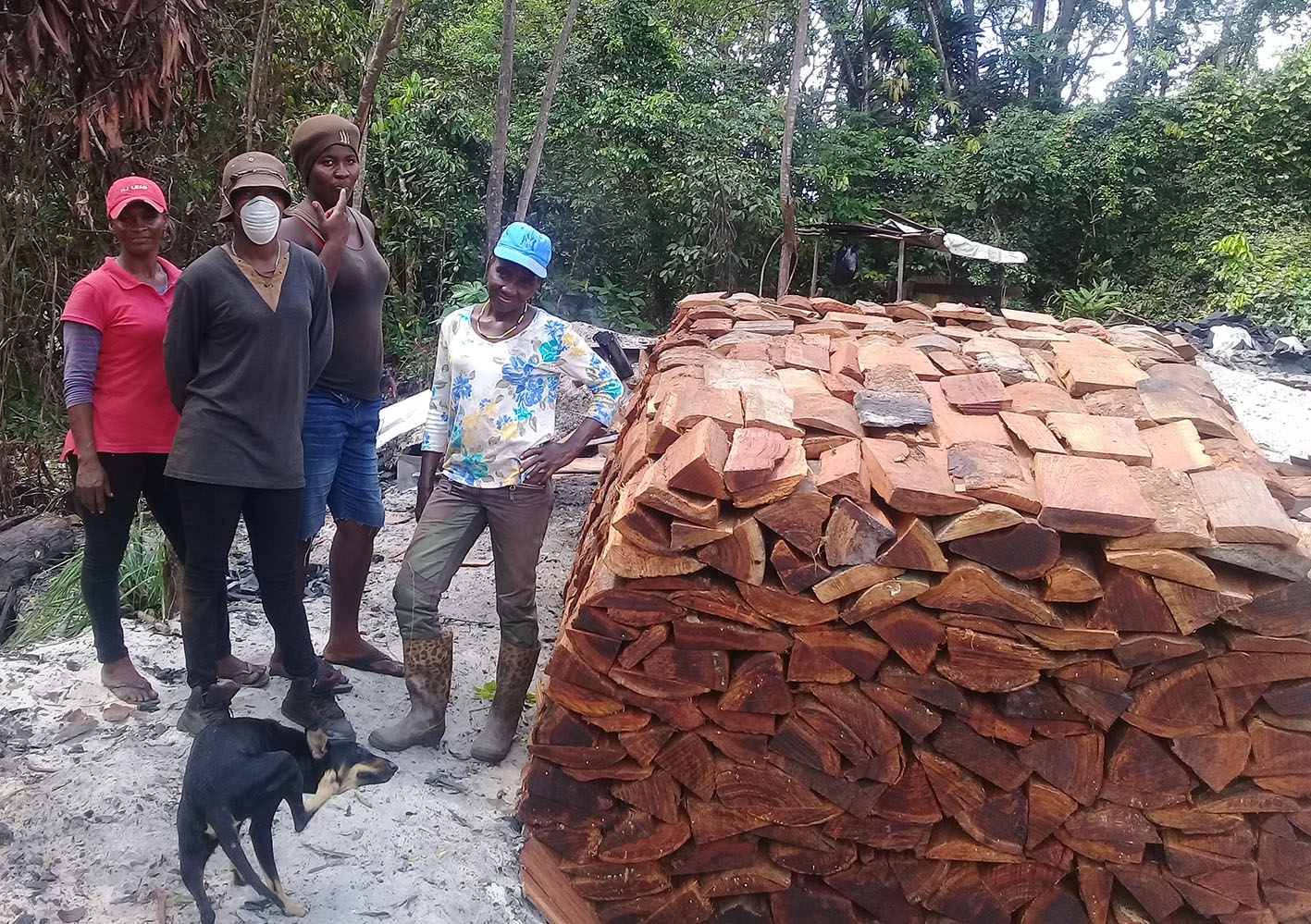Every morning, a pregnant Shondell King leaves her home and treks for about half of a mile to work which entails fetching pieces of wallaba wood and packing them into sandpits and even as she does this she may have a pit burning simultaneously to produce charcoal.
It is backbreaking work and at times is done in the blazing sun coupled with constant smoke from the various burning pits making for a most uncomfortable work environment. But for King it is her means of earning a living and it is one that she is fiercely proud of.
Even though pregnant with her second child she will continue to make the trek until it becomes “too much for me” because for her while she has a partner “two hands clapping” can bring in more income for the home.
“And leh me tell you just about two months after I get the baby I back here,” King told the Sunday Stabroek during a recent interview.

She is one of the many women who are members of the Yarowkabra Charcoal Burners’ Association which initially was formed mainly by single mothers of the community who took advantage of the wallaba waste that came from the Superior Shingles and Wood Products Inc. While today the 32 members of the association are both women and men—the president is a man—the women ensure that they are treated equally, and they do not shy away from doing what needs to be done to earn a living.
“We advise the pregnant women to stay away after a certain time you know for their own safety, but we can only advise,” said secretary of the association Marcita Andrews said as she looked at King who sat a few yards away.
King laughed but quickly pointed out that she is not ill and will work until her body tells her no.
She will receive $15,000 from the association sometime during or after her pregnancy as is the norm for members who become pregnant. The association, depending on who is at the helm or holds the position of secretary, also gives out hampers and juices to members for their birthdays and sometimes at Christmas. Members pay a monthly fee of $200, and $10 royalty on each bag of coal. There are times when fundraising activities are also held. The association also has a concession at Ituni and members would from time to time cut wood there; royalty from this is also paid over to the association.
Members are encouraged to pay their National Insurance Scheme contributions.

Carmen Higgins and Bernadette Mercier joined Andrews and King, even as men passed by fetching pieces of wallaba wood and shingles to their various pits. One of them, Frank Holder, jokingly referred to the area, which is just aback of the shingles company, as ‘the smoking city.’
Under a small makeshift tent with makeshift benches used by the members as a lunch area and a meeting place, Andrews sat with a bag with filled with documents. Across from her, King used a calculator and assisted with counting money and writing receipts which are handed out to members as they pass by.
The association is about ten years old, but even before its formation, the women recalled, they were burning charcoal with the waste that was being thrown out by the company. This happened until the Guyana Forestry Commission intervened and deemed the operation illegal.
But by then, the women said, it was a major source of income and they were not about to become daunted the commission’s ruling and decided to form a legal association which is registered under the Friendly Societies Act. Apart from its 32 members the association also has 12 persons who are on contract for six-month periods since it is not inclined to take in new members. The contractees may or may not have their contracts renewed based on their conduct, the women shared.
‘No start or finish’
According to the women, there is no starting or finishing time for work and some people work five days a week while others work seven days a week.
“Some people don’t work no day,” Andrews jokingly said explaining there are a few persons, mostly men, who just work for a few hours a day.
Every person has his/her own pits and Mercier pointed out that you cannot have one pit but must have about three at a time as the coals sometimes will take as much as 12 days to burn and as such there is need to have them burning simultaneously if one is to make money.
It is not just a matter of throwing the wood into the pit, it must be packed neatly, and the sides are then barred off with shingles which prevent sand from getting mixed with the wood. Old zinc is then placed at the top of the wood and the burning process begins.
Members work for themselves even though the orders are made through the association. Whatever members contribute to an order they are paid for. Persons visit the area with their own vehicles to uplift the coal, but the women said they sometimes refuse to sell to persons if the price is not right.
“So you see if you don’t work you don’t get paid,” Higgins noted pointing out that there are times when persons work until 9 pm, if that is what is needed.
She has six children, four of whom are miners and is a single parent which means she tries to put in long hours to ensure that her children are provided for.
“Look this thing does help out good, if you owe things like Courts and so you can pay your bill, it comes in good,” Mercier added.
While the Yarowkabra population is not big, the women said the fact that there are hardly any economic activities, there are times when people struggle and as such they are grateful for the association and the wood that is being provided free of cost.
The community has nursery and primary schools, but children have to travel for secondary education and this is what many parents find difficult.
“Some people would say how they see people in the association for years and they ain’t really making nothing but for me once you can send your children to school every day and provide food for them to eat then you are doing something,” Andrews said.
She pointed that many of them were about to build their own homes from the coal business and there is a member who owns a car and a bus.
Andrews said she also takes time off from the job, because she is aware that the work is difficult and “my body need rest. I does try to eat properly too because is whole day you in the sun working hard so you have to take care of your body.”
She, like King, has a partner but works hard to ensure that her family can have a better life.
And even though the community lacks economic activity the women were all in agreement that the men could do more. One was bold enough to say that the men “are lazy. Once they have food to eat they want sit on the corner and lime and talk.” They at times turn up their noses at the coal business, but do not have an alternative earning avenue.
“The work is not easy, but we do it,” Andrews pointed out, adding, “it does not matter if you are man or woman everybody do the same work.”
And King lamented the fact that the association had applied to the Guyana Lands and Survey Commission since 2015 for the eight acres of land just around where the coal mining pits are but they are being given the royal runaround and asked to return every three months. She appealed for the lease to be given as the association plans to use it for agricultural purposes.
‘Smoking city’
Holder, 58, who dubbed the area ‘the smoking city,’ said he turned to the coal burning after he separated from his wife and later lost his home.
He said it was Howard Bulkan, one of the owners of the shingles’ business, who saw his plight and offered him to live on the compound. Instead he chose to build a makeshift house just outside but is fiercely protective of the compound. He said the Bulkans have provided a great service to the community as persons are now able to earn. He expressed the wish for more companies to come into the community and open businesses to assist in its development.
Holder shared that he had left Guyana at the age of 11 but returned when he was 24 because as he put it he “could not deal with racism in that country.” He said that the peace of mind and freedom he experiences in Guyana were not readily available to him in England.
Meanwhile, George Bulkan, a director of Superior Shingles and Wood Products Inc and manager of the shingle plant, said the company was founded in 2001 and today is one of the largest wallaba shingles plant in the world. He said prior to the company’s establishment the community could have been described as a depressed one, as there were not many economic opportunities. Bulkan said that the company has “never one day sold one block of its wallaba waste”.






